- Home
- Mario Puzo
The Family Page 10
The Family Read online
Page 10
Pope Alexander went pale with rage. For long moments he was speechless, his mind dark with worry and fear. Finally he spoke. “Duarte, the fall of Rome would be a tragedy, but if my dear Julia were harmed, it would be a complete calamity. You must arrange for her release, for they will surely wish to ransom her.”
“What are your terms?” Duarte asked.
“Pay whatever you must,” Alexander said. “For Charles now has in his hands my heart and my eyes.”
The French, as well as being fine soldiers, were also known for their chivalry. Once they captured Julia Farnese and Adriana Orsini, they released all the servants who had accompanied them. Then they tried to charm the beautiful ladies with both food and amusing stories. But when Charles found out who the captives were, he immediately ordered that they be returned to the Pope.
“For what ransom?” the chief cavalryman asked.
Charles felt generous. “Three thousand ducats,” he said.
The commander protested. “Pope Alexander will pay fifty times that.”
“But we are here to gain the crown of Naples,” Charles reminded the general, “which is worth far more.”
Within three days, Julia Farnese and Adriana were returned to Rome unharmed, accompanied by four hundred French troops. And waiting at the gates joyful and relieved was Alexander.
Later, in his chambers, dressed as a cavalier with sword and dagger at his side, wearing shiny black boots from Valencia and a black cloak with gold brocade, he made love to Julia. And for the first time since she’d been gone, he felt at peace.
Pope Alexander, given the outrageous treachery of Virginio Orsini, knew that resisting the French was now hopeless. Without his fortresses to guard the entrance to Rome, there would be no stopping Charles. He needed time to develop a strategy to outsmart the young king, rather than to try to defeat the French in battle.
With his usual farsightedness, as soon as Alexander was made Pope, he had prepared for the possibility of a foreign invasion. He had commissioned a secure corridor between the rooms in the Vatican and the Castel Sant’ Angelo which could offer him protection. He had supplied it with enough food and water to last for at least one winter, and now he resolved to resist that long if necessary.
Now, under the watchful eyes of Duarte Brandao and Don Michelotto, Alexander and Cesare instructed their servants to gather their valuables—the gold tiaras, papal jewels, relics, beds, chests and tapestries—for their retreat to Castel Sant’ Angelo, an impregnable fortress. Their families came with them; even Vanozza abandoned her palace for the safety of Sant’ Angelo. And with great wisdom and sensitivity Cardinal Farnese whisked his sister, Julia, out of Rome, preventing any opportunity for discomfort to the Pope. The confrontation between past and present mistresses could cause Alexander more distress than the arrival of King Charles, for though Vanozza accepted Julia—never quite able to take her seriously—Julia was quite jealous of the mother of the Pope’s children.
On Christmas Day, the Pope ordered all troops from Naples to leave Rome at once. They were not strong enough to overcome the French troops, and Alexander feared that their presence in the city would make Rome seem a hostile place. Then Charles might resort to sacking the city, looting and pillaging all the valuables as they took capture—or, at the very least, failing to restrain his troops as they did so.
He told Duarte, “Please get a message to Charles. Tell him His Holiness, Pope Alexander, wishes to welcome him as he passes through our city on the way to Naples.”
Duarte frowned, his eyes narrowed. “Passes through?”
“In a manner of speaking,” Alexander said, but he looked concerned when he added, “though I’m not certain that is what the good king has in mind.”
In December, as falling snow turned everything gray, the distressed Pope Alexander and his son Cesare watched from the window of their fortress as the French army, in orderly ranks, marched through the gates of Rome.
Swiss troopers with lethal ten-foot pikes and spears, Gascons with crossbows and the small-caliber long guns they called harquebuses, German mercenaries with axes and spikes, and light cavalry with fearsome lances flooded the city. They were accompanied by heavily armored men at arms with swords and iron maces, and taking up the rear came row after row of marching French artillery-men walking beside gigantic bronze cannons.
In preparation for the king’s arrival, Alexander had set aside the lavish Palazzo Venezia for Charles. He would be attended to by the finest chef the Pope could commandeer, and hundreds of servants were enlisted to deliver all manner of luxury to the French monarch. In return for the Pope’s hospitality, Charles gave his troops strict instructions that there was to be no looting or other violence in the city, under pain of death.
But while Charles was enjoying his “visit” to Rome, impressed by the respect the Pope had shown him, Cardinal della Rovere and his dissident cardinals were whispering in the king’s ear, repeatedly warning Charles of the Pope’s cunning and urging him to convene a General Council.
Alexander sent one of his many loyal cardinals, and one of his most persuasive, to speak to the king, to defend him against Cardinal della Rovere’s charge of simony. And Charles seemed more persuaded by the arguments of Alexander’s minister than by the harping of frantic della Rovere.
No General Council was called.
Instead, after several days, King Charles sent a sealed message to the Pope. As Alexander unrolled the parchment, he allowed himself a deep breath. He scanned the royal document carefully, and tried to apprehend the mood of the writer. It was a request. King Charles wanted an audience with him.
The Pope was relieved. He had accomplished what he hoped for. His strategy was working; now it appeared that this almost impossible situation could be negotiated to his advantage. Though his territory had been breached by Charles and his troops, the Pope knew he must maintain an air of superiority with this impetuous French king. He didn’t want to appear arrogant; still, he understood he must avoid making his relief obvious.
The Pope arranged for a meeting in the Vatican gardens. But timing would be crucial. Alexander knew he could not arrive before the king and appear to be waiting, yet it was just as important that the king not arrive first and be kept waiting. This is where Alexander’s genius was its most refined.
He was carried by litter from Castel Sant’ Angelo to the meeting place in the garden. But he instructed his bearers to hide him behind a large bush alongside one of the stone buildings. There he waited soundlessly for twenty minutes. Then, just as he saw King Charles enter the garden and begin to walk the long path lined with scarlet roses, Alexander’s bearers brought forward his litter.
Pope Alexander was outfitted in one of his most imposing garments: the three golden crowns a sparkling beacon on his mitered headdress, a great jeweled crucifix dangling against his chest.
Charles, the mighty king of France, the most powerful military nation in Christendom, was a tiny, almost dwarflike man, who walked on elevated boots and seemed to conceal his person in voluminous garments in all the colors of the rainbow. He was so obviously awed by the stature of Pope Alexander that a trickle of saliva ran from his mouth.
And so it was, within this garden filled with holy roses, that Pope Alexander negotiated to save Rome.
The following day, Pope and king met again to finalize their agreement, this time in the Hall of Popes. Alexander knew this would allow him the advantage. Charles would consider it a holy place, as sacred a venue as there could be.
Alexander dictated that the preamble read in such a way that Charles could never move to depose him. “Our Holy Father,” it stated, “shall remain the good father of the king of France, and the king of France shall remain a devoted son to our Holy Father.” Then it was time to get to the other business at hand.
Alexander would provide the French army with free passage through all the Papal States, with provisions to boot. In short, if Charles could win Naples with arms, Alexander would give him the approval of
the church. To ensure this, the Pope would hand over his dearly beloved son Cesare to King Charles as a hostage. Cesare Borgia would also be given authority to crown Charles as king of Naples once the city was conquered.
Prince Djem, still held captive by the Pope, would also be handed over to Charles, but the Pope would be permitted to keep the forty thousand ducats that the sultan of Turkey paid each year to keep his brother captive. Charles would use Djem as one of the leaders of the Crusade, to blunt the vigor of the defending Infidel.
King Charles’s foremost desire was to be named by the Pope as the official commander of the Crusades. Alexander agreed, but insisted first Charles must swear obedience to him, and acknowledge him as the true Vicar of Christ.
It was agreed, with the exception that Charles would be named commander of the Crusades only after he had conquered Naples.
Charles bowed several times as was necessary, and kissed Alexander’s ring. Then he said, “I swear obedience and reverence to Your Holiness, as have all the kings of France. I acknowledge you, Holy Father, as the pontiff of all Christians, and the successor of the apostles Peter and Paul. Now I offer everything I own to the Holy See.”
Alexander rose, clasped Charles in his arms, and said, “I will grant you three favors,” as was the custom. Before a vassal swore obedience and reverence to a new lord, he had the right to ask favors. To avoid indignity to the holy office, it was understood that the favors would be negotiated beforehand and thus would not seem to be bargaining.
Charles continued. “I ask that you confirm my family in all its royal privileges, that you decree we rule by God’s will. Second, that you bless my expedition to Naples. And third, that you name three of my designees as cardinals, allowing Cardinal della Rovere to reside in France.”
Pope Alexander agreed to the terms, and so, with great joy, King Charles called from his company a tall, reed-thin man with a long face and mournful eyes. “Your Holiness, I wish to introduce my physician and astrologer, Simon of Pavia. His reading of the stars influenced my decision more than any other factor, and led me to reject the urgings of Cardinal della Rovere and to place my trust in you.”
Thus, from a position of helplessness, Alexander had negotiated a reasonable peace.
Later that evening, Alexander called Cesare into his chambers to explain the afternoon’s agreement with King Charles.
Cesare felt a quick rush of anger as he listened, but he bowed his head. He knew that, as a cardinal and the Pope’s son, he was logically an appropriate hostage. His brother Juan, who would soon become captain general of the papal army, could not be the primary hostage. Cesare’s anger had less to do with the danger of the situation than with the way the transaction reminded him that he was a pawn to be traded on the whim of others.
Alexander sat down on the beautifully carved chest at the foot of his bed, the lid intricately carved by Pinturicchio. Inside that chest were drinking goblets, many nightclothes, extra perfumes and essences—all necessary when Pope Alexander brought his mistresses to his sleeping chambers at the Borgia apartments. He preferred sitting on this chest more than on any of the chairs in his chambers.
“My son, you know I am not able to send your brother Juan to be hostage, for he is to become the captain general of the papal army. Therefore, it must be you,” Alexander told his son, acknowledging Cesare’s irritation. “Charles has also demanded Djem as a hostage, so you will have a companion. Cheer up! Naples is an enjoyable city for a young fellow like yourself.” Alexander paused for a moment, his dark eyes merry. Then he said to Cesare, “You are not fond of your brother Juan.”
But Cesare was used to this trick of his father—the joviality that masked a serious intent. “He is my brother,” Cesare said respectfully. “So I am fond of him as my brother.”
Cesare had far more terrible secrets to hide than his hatred of his brother—secrets that could ruin his life, and his relationship with his father, the church, and his fellow men. So he did not try too hard to conceal his dislike for Juan. Instead he laughed. “Of course, if he were not my brother, he would be my enemy.”
Alexander frowned with annoyance. He knew he was missing something of importance. “Never say that, even in jest. The Borgia family has many enemies, and we can only survive holding faith with each other.” He rose from the chest and came to Cesare and embraced him. “I know you would rather be a soldier than a priest. But believe me, you are more important in the family plans than Juan, and you know how much I love your brother. But when I die, everything falls unless you are there to succeed me. You are the only one of my children who can accomplish this. You have the wits, the daring, and the fighting skill. There have been warrior Popes before, and surely you can be one.”
“I am too young,” Cesare said impatiently. “You would have to live another twenty years . . . ”
Alexander gave him a push with his hand. “And why not?” He grinned at Cesare, that roguish grin which so endeared him to his children and his mistresses. His deep baritone voice rolled off at full measure. “Who enjoys a banquet more than I? Who can hunt more hours a day than myself? Who loves women better? If it were not so strictly against canon law for a Pope to father children, how many more bastards would I now have? I will live another twenty years, and you shall be Pope. I have already planned it.”
“I would rather fight than pray,” Cesare said. “It is my nature.”
“As you have proven,” Alexander sighed. “But I tell you all this to prove my love for you. You are my dear son and my greatest hope. Someday you, not Charles, will regain Jerusalem.” He paused for a moment, overcome by emotion.
Alexander’s most formidable weapon was his ability to inspire a feeling of well-being in his company—it was this ability to make each person believe that their welfare was of the greatest importance to him that gained their trust, and made them believe more in him than they did in themselves. This was his true treachery.
And so it was in his dealings with royalty, his children, and his subjects: for as long as he was Pope, the entirety of earth was under his dominion.
For a moment the charm of Alexander entranced Cesare. But the reference to another Crusade broke the spell. Popes and kings had often used the hope of another Crusade to extract money from the believing people; it was another source of revenue. But the time for a Crusade had passed, for Islam was now too strong. It threatened Europe itself. Venice lived in fear that its worldwide trade would be cut off by such a war and that the Turks might even attack their city. France and Spain were constantly at each other’s throats for the crown of Naples, and the Pope himself had all he could do to maintain its temporal power in the Papal States of Italy. And his father was too clever not to know all this. But Cesare also knew that Juan was first in his father’s heart—and rightly so, he thought. Juan had the wiles of a devious woman and the fickle heart of a courtier. At times he could even charm Cesare himself, though Cesare despised him because he thought him a coward. Commander of the papal army? A joke!
“When I lead the Crusade, I will have my head tonsured,” Cesare said. It was a joke between his father and himself. Cesare had never worn his hair in the priestly tonsure.
Alexander laughed. “After you lead the Crusade, perhaps you can persuade the church to do away with both celibacy and tonsure for priests. Perhaps they are both healthy practices, but still they are unnatural.” Alexander was silent for a moment, lost in thought. Then he said, “Let me remind you of one thing. When you accompany the army of France to Naples, you must guard the life of your fellow hostage, Djem. Remember, the sultan of Turkey pays me forty thousand ducats each year for his keep. If he dies, no more money; if he escapes, no more money. And he brings in more money than a cardinal’s hat.”
“I will guard him and myself,” Cesare said. “I trust that you will restrain my brother Juan in Spain. He must do nothing to alienate King Ferdinand and thus endanger our safety with the French king.”
“Your brother acts under my orders only,” Ale
xander said. “And my orders will always be to protect you. After all, you, my son, hold in your hand the future of the Borgia.”
“I will do my best for you always,” Cesare said. “And for the church.”
Knowing that by afternoon he would be taken hostage and forced to leave Rome, Cesare left the Vatican before dawn and rode far into the countryside. He had only one purpose in mind.
After riding for quite some time, over hills and through a forest alive with the rustling of animals and the hooting of owls, he reached the outskirts of the small village just as the sun was rising to push away the shadows of night. His horse was sweaty from the speed and strain of the journey.
When he came upon the small stone cottage, he called out. “Noni, Noni,” he shouted, but no one answered. As far as he could see, the fields were empty. He rode around the back.
There an old woman, nearly doubled forward by age, rested heavily on a hawthorn stick. She shuffled as she walked through the garden, a wicker basket on one arm filled with freshly picked herbs and flowers. For a moment she stopped and stood with her head bent so low she almost toppled over; then slyly she raised her head and looked around in all directions. But through her clouded eyes she didn’t see him. She placed her basket on the wet ground, picked one more small bundle of herbs, and placed them carefully on the very top of the flowers. She cast her gaze upward and crossed herself. Then, as though confused, she shuffled off, her sandals dragging through the mud.
“Noni,” Cesare called to the old woman again as he rode up closer to her. “Noni!”
The woman stopped when she saw him and quickly raised her hawthorn stick to strike. But then through squinting eyes she recognized him. Only then did she smile. “Come down, my boy,” she said, her voice strained with age and emotion. “Come here and let me touch you.”

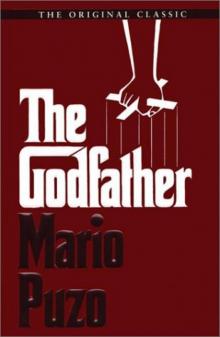 The Godfather
The Godfather The Dark Arena
The Dark Arena The Family
The Family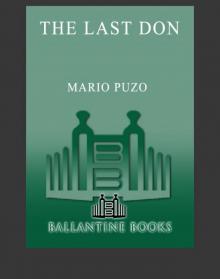 Last Don
Last Don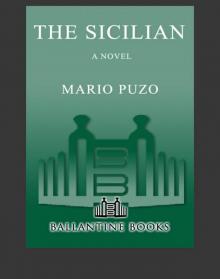 The Sicilian
The Sicilian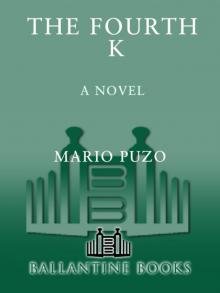 The Fourth K
The Fourth K Omerta
Omerta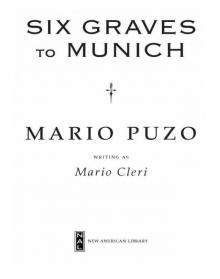 Six Graves to Munich
Six Graves to Munich The Family Corleone
The Family Corleone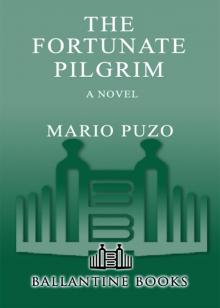 The Fortunate Pilgrim
The Fortunate Pilgrim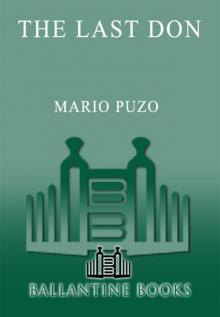 The Last Don
The Last Don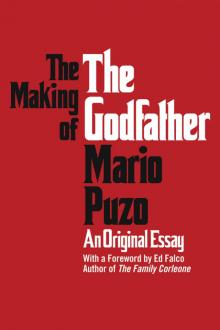 The Making of the Godfather
The Making of the Godfather Fools die
Fools die The Sicilian (v2.0)
The Sicilian (v2.0)